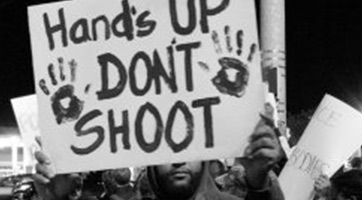

The Eighth Circuit Court of Appeals sided with the argument put forth by the National Police Association in the amicus brief it filed on behalf of the City of Ferguson, Missouri; former Ferguson Police Chief Thomas Jackson, and former Ferguson Police Officer Darren Wilson, supporting their motion to dismiss in the case of Johnson v. City of Ferguson, et al.
The issue was whether the plaintiff, Dorian Johnson was seized at the time that Officer Wilson had only ordered him to get off the street, and whether the qualified immunity rule applied to Officer Wilson. The brief argued Plaintiff Johnson was not seized by Officer Wilson, that the qualified immunity rule should apply and that the lawsuit should be dismissed.
On August 9, 2014, in Ferguson, Missouri, Michael Brown and the plaintiff in this lawsuit, Dorian Johnson were observed by Officer Wilson to be walking in the roadway. Defendant Darren Wilson testified he ordered them to move to the sidewalk. After Brown and Johnson refused to comply, they approached Wilson with Brown attacking Officer Wilson in his police vehicle. A fight commenced over control of Wilson’s handgun. Brown and Johnson then fled, with Wilson in pursuit. Brown turned to attack Wilson again and was fatally shot by Wilson.
Violent protests followed the encounter. Repeating false claims that Brown had surrendered before he was shot, protesters chanted, “Hands up, don’t shoot.” Protests, vandalism and looting, continued for over a week in Ferguson.
In the aftermath of these events an erroneous narrative of police misconduct has produced what is now known as the “Ferguson Effect”. The Ferguson Effect has become so prevalent as to embolden suspects to refuse to comply with police commands, instigate violence against officers and bring civil actions against police who are guilty of nothing more than doing their job. The result of the Ferguson Effect has been a reduction in proactive law enforcement by agencies across the country and corresponding increases in violent crime.
On March 4, 2015, the U.S. Department of Justice reported the conclusion of its own investigation. It found forensic evidence supported Officer Darren Wilson’s testimony and that of the witnesses who corroborated Officer Wilson’s account.
Despite the findings of the U.S. Department of Justice, on April 29, 2015, Johnson filed this lawsuit seeking money damages against the defendants claiming he had been seized unlawfully by Wilson. The lower court denied the defendant’s motion to dismiss. An appeal to the 8th Circuit followed.
The Fourth Amendment issues and consequences to individual law enforcement officers in this case were of the utmost importance – importance not only to those who dedicate their careers and place their lives in harm’s way to protect their fellow citizens but to those citizens and their communities. It is the responsibility of the National Police Association to raise these issues and by doing so serve the interests of those who serve us all so selflessly. The National Police Association is grateful the Eighth Circuit Court of Appeals reversed the lower court’s refusal to dismiss.
The National Police Association was represented by Kent S. Scheideger of the Criminal Justice Legal Foundation. The case is 16-1697 Dorian Johnson v. City of Ferguson, et al in the United States Court of Appeals for the 8th Circuit.
The ruling can be found here
The Amicus Brief filed by the National Police Association can be found here